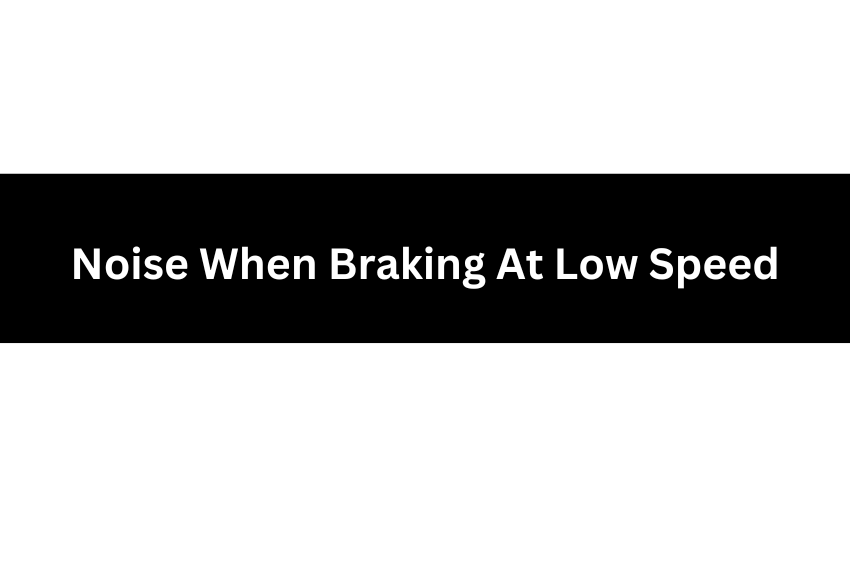Do you hear a strange noise when you brake at low speed?
It’s a common problem that many drivers face.
Brake noise can happen for several reasons, and some fixes are easy to do yourself.
In this guide, we’ll explain how to diagnose the cause of the noise and provide you with the steps to fix it, so you can drive more comfortably and safely.
Why Does My Car Make A Noise When Braking At Low Speed?
Noise when braking at low speed can happen for several reasons, such as dirty brakes or worn-out pads.
One common cause is dirt or debris trapped in the brakes.
Small particles can stick to the brake pads or rotors, causing a squeaking or grinding sound.
This often happens after driving through dusty or muddy areas, and a simple cleaning might fix the issue.
Another reason for brake noise at low speeds is worn-out brake pads.
Brake pads have a material that wears down over time.
Many pads come with wear indicators, which are small metal strips designed to make a squealing noise when the pads are too thin.
If you hear this, it’s a clear sign that your brake pads need replacing.
Driving with worn-out pads can damage your rotors, which are more expensive to fix.
Sometimes, moisture can cause brakes to make noise, especially after a car has been sitting overnight.
This happens because a thin layer of rust forms on the rotors due to condensation.
When you brake, this rust gets scraped off, causing a squeaky sound.
The noise usually goes away after a few stops.
Brake noise can also result from uneven rotors or issues with the brake calipers.
Rotors that are warped or not smooth can create vibrations and grinding sounds.
Sticking brake calipers can cause the pads to drag against the rotor, leading to constant noise.
Is Brake Noise At Low Speed Dangerous?
Brake noise at low speed can sometimes be dangerous, but not all noises indicate a major problem.
If you hear a high-pitched squeaking, it could be due to moisture or light rust on your brake rotors.
This is common after your car has been sitting overnight or in damp weather.
The rust usually wears off after a few stops, and the noise goes away.
In this case, there’s no immediate danger.
However, a grinding sound while braking is often a sign of worn-out brake pads.
Brake pads have a layer of material designed to create friction and stop your car.
When this layer wears down, the metal parts of the pads can press directly against the brake rotors, causing grinding noises.
This isn’t just loud, it can damage your rotors and increase the risk of brake failure, which is dangerous.
Another concerning sound is a constant squealing or screeching that doesn’t go away.
This could mean your brake calipers are sticking or that the wear indicators on your brake pads are signaling it’s time for a replacement.
Ignoring this can lead to bigger, more expensive problems and potentially unsafe driving conditions.
If the noise is consistent or getting worse, it’s a good idea to have your brakes checked by a professional.
Some noises are harmless, but others can affect your car’s braking performance and put your safety at risk.
It’s always better to address brake issues early to avoid costly repairs and ensure your car is safe to drive.
How To Fix Brake Noise At Low Speed?
Here’s a simple step-by-step guide to help you reduce or fix brake noise at low speed:
Step 1: Inspect Your Brakes For Dirt Or Debris
As we’ve said, brake noise at low speed can sometimes be caused by dirt, small stones, or rust on your brake pads or rotors.
Start by checking for any visible buildup or debris.
If you see rust, driving your car a short distance and using the brakes lightly can wear it off naturally.
Step 2: Clean The Brake Pads And Rotors
If dirt or grime is causing the noise, clean the brake pads and rotors using a brake cleaner spray.
Spray it directly on the components, and wipe them with a soft cloth.
This simple step often resolves squeaky brakes quickly.
Step 3: Check For Worn-Out Brake Pads
Brake pads wear out over time, and when the friction material gets too thin, it can cause squealing or grinding noises.
Look for visible signs of wear.
If the pads are thin or the wear indicators are exposed, replace them.
Step 4: Apply Anti-Squeal Lubricant
For persistent squeaking, you can apply an anti-squeal lubricant to the back of the brake pads.
This helps reduce vibrations that often cause noise.
Step 5: Look For Uneven Rotors
If cleaning and pad replacement don’t help, check your rotors.
Uneven or warped rotors can cause grinding noises.
In this case, resurfacing or replacing the rotors may be necessary.
With that said, If the noise persists after these steps, consult a mechanic.
Problems like sticking calipers or damaged brake components can be harder to fix on your own.
Related Post:
Noise When Pressing Brake Pedal
5 Reasons Why Brakes Still Grinding After Replacing Pads And Rotors
Why Are My Brakes Grinding When I Stop?
